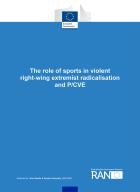Details
- Publication date
- 19 October 2021
- Author
- Directorate-General for Migration and Home Affairs
- RAN Publications Topic
- Sports
Description
It is well-known that sport has the potential to positively influence our physical as well as mental health. Sport can also increase self-awareness and nurture team spirit, serve as a tool to process emotions and experiences, and play a part in identity formation. Especially during childhood and puberty, sport can play an important role in personality and competency development.
Whether in the form of ball sports, athletics, martial arts or horse riding, sport can enhance social and cognitive skillsets. Being part of a team but also supporting a team as part of a fan club can generate a strong sense of togetherness, support and belonging. For many sports players, team members are close friends who offer a safe space outside their own families and with whom they can share emotions and experiences.
Sport can also improve competencies such as discipline, emotional control, self-confidence and leadership, team spirit and the ability to work within and navigate heterogeneous environments in a positive manner. Sports clubs and facilities (as well as coaches and instructors) are typically viewed favourably by society as positive contexts and meeting places for young people.
However, the inconvenient truth about all of these positive factors is that, as is often the case with many supposed protective or “resilience” factors, they can also prove to be negative, depending on the social context and individual needs as well as the influential factors. Hence, (competitive) sports can also be viewed from a sceptical perspective that showcases the implications of sociocultural narratives.

